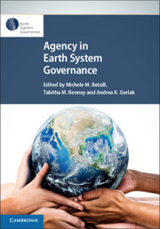External publications

Conclusion:policy implications of ESG–agency research and reflections on the road ahead
Gerlak, Andrea K. / Michele M. Betsill / James J. Patterson / Sander Chan / Tabitha M. Benney / Marie-Claire Brisbois / Thomas R. Eimer / Michelle ScobieExternal Publications (2020)
in: Michele M. Betsill / Tabitha M. Benney / Andrea K. Gerlak (eds.), Agency in earth system governance, Cambridge: Cambridge Univ. Pr., 183-197
ISBN: 978-1-10868-827-7
DOI: https://doi.org/10.1017/9781108688277.015
Information
The role of the state as an agent of earth system governance has become more complex, contingent, and interdependent. − Although participatory and collaborative processes have contributed to more effective, equitable, and legitimate environmental governance outcomes in some instances, analyses of these processes should be situated within a broader governance perspective, which recasts questions of policy change around questions of power and justice. −The complexity and normative aspects of agency in earth system governance requires new forms of policy evaluation that account for social impacts and the ability of governance systems to adapt. − Many of the core analytical concepts in ESG–Agency scholarship, such as agency, power, authority, and accountability, remain under-theorized. In addition, some types of actors, including women, labor, non-human agents, those who work against earth system governance, and many voices from the Global South, remain largely hidden. − ESG–Agency scholars need to develop research projects and collaborations in understudied regions while also recruiting and supporting scholars in those regions to engage with this research agenda.
Contact
Cornelia Hornschild
Publication Coordinator
E-mail Cornelia.Hornschild@idos-research.de
Phone +49 (0)228 94927-135
Fax +49 (0)228 94927-130
Alexandra Fante
Librarian/ Open Access Coordinator
E-Mail Alexandra.Fante@idos-research.de
Telefon +49 (0)228 94927-321
Fax +49 (0)228 94927-130



![[Translate to English:] Photo: Alexandra Fante, Bibliothekarin/Open Access-Koordinatorin](/fileadmin/_processed_/f/0/csm__c_Deutsches-Institut-fuer-Entwicklungspolitik_Fante_94ce4fa1ba.jpg)